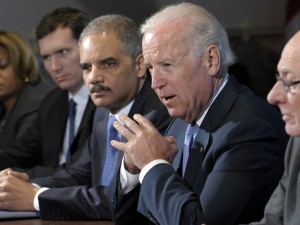The current meme on right wing talk radio regarding gun control is that there are some rare unforeseeable tragedies—such as the Newtown massacre—that just occur as part of the random awfulness of life. Government cannot prevent every last bad outcome, counseled Rush Limbaugh yesterday. Michael Medved deconstructed the various proposed gun measures and persuasively argued that none of them would have prevented Adam Lanza from gaining access to his guns; today Medved repeatedly asserted that pace the President, there is no “epidemic of gun violence”—gun violence is dropping, he rightly said (which begs the question of whether even if shootings are falling, the level of gun violence in the U.S. can rightly be characterized as an “epidemic”).
These are by and large wise words, even though as a purely instinctual matter, having no affinity for guns, I am readily prepared to accept tighter limits on high-powered weaponry, regardless of the inexact fit between the legislative goal and the desired outcome. (I understand the arguments to the contrary, however, even if I do not resonate to them.) The problem with this “don’t expect the government to protect you from every harm” argument is that conservatives flagrantly ignore it when it comes to Islamic terrorism. If mass shootings are extremely rare, Islamist-inspired homicides on American soil are rarer still. According to Michael Shermer, citing research by James Alan Fox, an average of 25 people are murdered with guns each day, or one an hour (a rate that if caused by influenza would clearly be deemed “epidemic”). There are 20 mass shootings a year (defined as taking out at least four victims). By contrast, we have had the 1993 World Trade Center bombing, the 9/11 attacks, and the Fort Hood shootings—three incidents over two decades. And yet conservative opposition to the creation of an entire new federal department to fight terrorism was muted at best, and largely limited to issues of unionization. As for the need for some sort of massive federal effort, not to mention a war, to protect Americans from terrorism, conservatives were nearly all on board. We now have an entire multibillion dollar terrorism-industrial complex selling government ever more high-tech goodies to detect and guard against a largely hypothetical threat (especially regarding chemical and biological weaponry), and infantilizing airport security measures that cost billions in lost time and thus commerce.
Many in the right-wing media world warn regularly about the unending threat of Islamic terrorism, and rail demagogically against Democratic politicians for not doing enough to protect us from the threat. Yet garden variety gun violence takes out magnitudes more Americans each year than terrorism.
Gun rights advocates might respond that the difference is the Second Amendment. But as Justice Scalia has pointed out, a right to bear arms does not rule out reasonable regulations on assault weapons, whose existence the Founders did not necessarily foresee. And in any case, the issue is simply how one evaluates risk.

 Gleanings (“important developments in the church and the world”!)
Gleanings (“important developments in the church and the world”!)  Should people be allowed to see details of their own genetic information?
Should people be allowed to see details of their own genetic information?

 Cross-posted on the
Cross-posted on the From a Guardian
From a Guardian  It’s no great secret that the Vatican has never been particularly fond of the idea of free markets, but here is yet more nonsense from Benedict XVI to remind us of just that.
It’s no great secret that the Vatican has never been particularly fond of the idea of free markets, but here is yet more nonsense from Benedict XVI to remind us of just that.